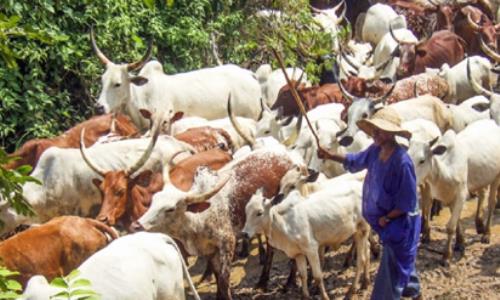Farmers across rural communities in Ogun State are grappling with a rising wave of cattle rustling incidents that have decimated livestock, inflicted injuries, and left many emotionally distressed.
Local leaders and authorities report a disturbing increase in attacks, with armed rustlers targeting herders and farm owners during early morning or late-night raids.
The attackers, often wielding machetes and other dangerous weapons, have been storming farmlands, stealing cattle, and violently assaulting anyone who resists. Several victims have sustained serious injuries, with some requiring urgent medical attention.
One of the most recent incidents occurred between Tuesday, September 9, and the early hours of September 10 at A & A Harmony Farms in Okunowa, Ijebu. Farm owner Sina Akinsanya recounted the harrowing experience, revealing that the intruders neutralized all security systems before making off with valuable livestock and supplies.
“Our lone security guard was overpowered, blindfolded, and restrained. His phone was taken, and all our floodlights and CCTV cameras were destroyed,” he said.
“The SIM cards were removed from the cameras. The cost of the damage is close to ₦2 million. Eight cows valued at ₦14 million, along with about ₦1 million worth of medication, were stolen,” Akinsanya added, expressing fears that the attackers had threatened to return.
In another attack in Imodi Mosan, Ijebu, a farmer narrowly survived after his property was targeted. His security guard, a member of the Oodua People’s Congress (OPC), sustained life-threatening injuries and remains hospitalized.
“We are praying for his recovery. The wave of attacks has left livestock owners terrified and uncertain about the future. Some are now quitting the business altogether. This is my second attack in three months. A total of 25 cows are gone. Two farms near me were also hit in the last two weeks. I am quitting,” said Kola, a farmer in the area.
The situation is equally dire in Odeda and Yewa North, where subsistence farmers and herders say the insecurity has sparked panic and deepened economic hardship, threatening their means of survival. Many have appealed to the Ogun State Government for urgent intervention, calling for enhanced security and protection.
The crisis unfolding in Ogun reflects a broader regional threat. Last year, the Food and Agriculture Organisation of the United Nations (FAO), through its Subregional Office for West Africa, convened a workshop in Saint-Louis, Senegal, to address the rising menace of cattle rustling across West Africa and the Sahel. Experts at the meeting warned that rustling has evolved from isolated theft to organized, cross-border crime marked by deadly violence and linked to wider conflict economies in countries like Nigeria, Niger, Burkina Faso, and Mali.
FAO’s Animal Health and Production Officer, Dr. Lionel Gbaguidi, estimated the economic toll of cattle rustling at $432 million annually in Nigeria, $32 million in Mali between 2016 and 2022, and $3.2 million per year in Senegal. Beyond financial losses, the practice fuels unregulated slaughter, raising serious public health risks due to potential exposure to zoonotic diseases.
“Cattle rustling is inseparable from instability and conflict. Authorities, civil society, and the international community must recognize its role in fueling violence and make it central to peace and security efforts,” said Mali’s National Director of Animal Production and Industries, Mr. Djakalia Ouattara.
Livestock remains vital to West Africa’s economy, contributing up to 44 percent of agricultural GDP in some Sahelian states. With more than 84 million cattle and over 311 million small ruminants, the region holds nearly a third of Africa’s livestock population. Yet, this critical sector is increasingly under threat.
For farmers in Ogun, the danger is immediate and deeply personal. Without urgent action, they warn, the state’s food security and rural economy could suffer lasting damage.

